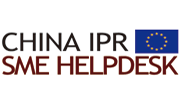11 October, 2017
As the food and beverage market offers many business opportunities to European SMEs as Chinese consumers are looking for healthy quality products, we have dedicated today’s blog post to geographical indications protection in China. Registering geographical indications in China offers another layer of protection to SMEs that are producing European high-quality products associated with certain regions or production methods.
What is a Geographic Indication (GI)?
“Champagne”, “Bordeaux”, “Parma Ham”, “Parmesan”. Each of these products, associated with certain regions, are renowned and trusted for their nature, quality and authenticity. As a consumer, you are probably more familiar with “Scotch”, “Cognac” and “Bavarian beer” than unnamed brands claiming to use the same ingredients. A GI is therefore a labelling that identifies a good as originating in a specific territory, region or locality, where characteristics of the good are associated with its place of origin.
GIs are protected by World Trade Organization (WTO) signatories, including all 28 European Union (EU) Member States (MS) and China – since 2001. This is designed to prevent unfair competition and to protect consumers from purchasing goods that misleadingly claim to be from a particular place.
Made in China?
China’s middle class is growing; as has its appetite for imported – predominantly Western – products. Younger generations spend significantly less time cooking than their parents and are increasingly quality- and status-conscious. In addition, food safety concerns in recent years have encouraged Chinese shoppers to more carefully consider the origin of the products that they consume. Purchasing patterns have therefore experienced a significant shift. Regarding food, large numbers of Chinese people are purchasing brands that are recognised for their quality and food safety standards – this has stimulated a rise in sales of Western goods. Similarly, while sales of traditional alcoholic drinks, like baijiu, still dominate in many places, individuals in wealthy Tier 1 cities are increasingly opting for higher-end Western wines, beers and spirits.[1]
China is now the world’s largest importer of food and the EU is its largest exporter of food & beverages, with F&B exports to China worth EUR 10.3 billion in 2015. The current social and economic climate in the food and beverage industry therefore provides fertile ground for counterfeiters and infringers. If you intend to export products from a specific geographic region, obtaining GI registration can provide necessary evidence of your product’s origin, which will increase trust for your brand among domestic consumers.
Covering your back – registering a GI in China
There are four key steps to protecting your GI in China. These are:
Contacting your GI organisation: This is the organisation that regulates your specific GI, such as the Bordeaux Wine Council. Your GI organisation can be used to check whether a GI for your product is already protected in China. If it is, you can apply for a User Permit for your product.
Recommending that your GI organisation registers the GI as a certification or a collective mark: This step should be used in the event that your GI is notalready registered in China. Under Chinese Trademark Law, GIs can be registered as certification or collective marks. Chinese Trademark Law only protects your GI if it is registered – so it is strongly recommended that this is done as soon as possible so as to protect your product from imitation products. A GI can be a geographic name (e.g. “Roquefort” blue cheese), a symbol or logo (e.g. a picture of the Leaning Tower of Pisa), the outline of a geographic area (e.g. a map of Paris), or anything else that identifies a product with a source region.
However, if your name or sign resembles a national flag or emblem you need to consult the relevant country’s government.
Registering for GI protection at the AQSIQ: For extra protection regarding product quality standards, your GI organisation can register with the AQSIQ. This double approach will ensure that your product receives maximum GI protection in China.
Monitoring your supply chain: To be able to enforce your GI rights, you first need to know when your rights have been infringed. Ensure that you are closely monitoring your supply chain to guarantee that your sales staff, distributors and intermediaries are selling your authentic products. Supply chain infiltration can severely harm your reputation and undermine your business. It is also important to be aware of what is happening in the market. If you discover copycat products infringing your GI inform your GI organisation as soon as possible.
[1] http://www.chinabusinessreview.com/understanding-chinese-consumers/
Helika Jurgenson, China IPR SME-Helpdesk





